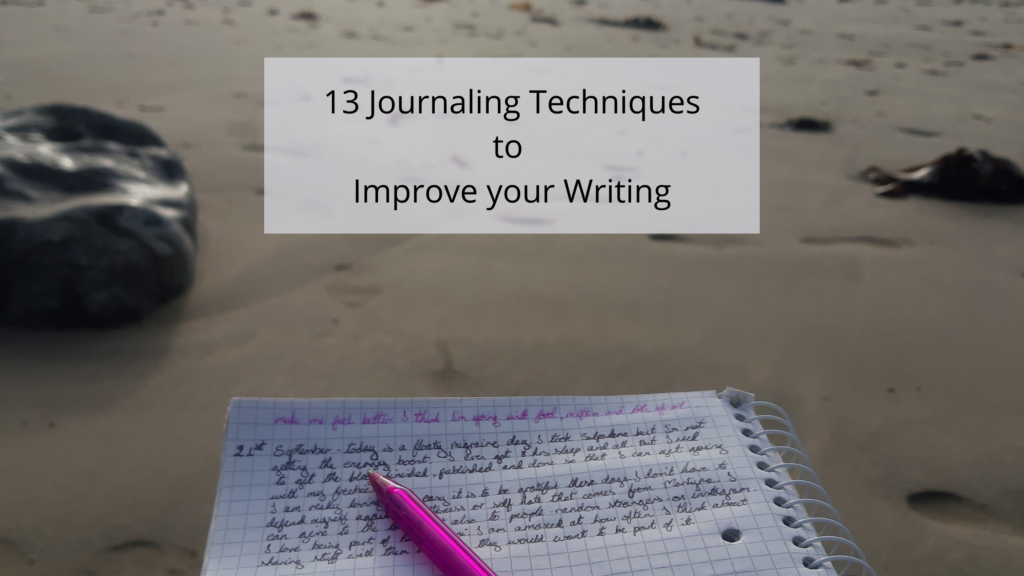13 Journaling Techniques to Improve your Writing

Choose from this selection of journaling techniques.
There are lots of journaling techniques to choose from. The most important part of journaling is that you do it. How often and what it looks like is completely up to you.
Getting used to regularly sitting down and producing words will always help your writing. Journaling is a great way to get to know yourself better which will also help your writing.
There are lots of benefits to journaling, such as mental health and physical health. I wrote more about the many, many benefits here.
When you have made the decision to include journaling your next decision is what type of journaling are you going to do?
Maybe you have not been journaling because you are confused by how many options there are. You might be already journaling and wondering if there is an easier way?
I use a pen and a notebook and free write. This is the journaling technique that works best for me. Before I wrote this post I spent a few minutes writing in my journal.
The reason this journaling technique works for me is partly because I had a diary when I was younger and that was the only option I know about at that time. Partly because I enjoy writing and putting my thoughts down in words feels good for me.
Don’t feel trapped in any particular type of journaling. I occasionally use bullet points instead of full sentences. When life is busy jotting down 5 bullet points can feel like a lot, never mind decorating the page with images as well. But if drawing images and choosing a colour palette makes you feel good then go for it.
Read on for a list of 13 different journaling techniques.
These first 3 journaling techniques are the broad categories that all of the other styles are variations of.
1. Freewriting
This is my favourite method. You can write what you like and how you like. You can even change it up to include some of the other techniques if you want. There are very few guidelines here. There is no need for punctuation or grammar. You are only writing for yourself.
I find it great for getting rid of the distracting surface thoughts before I start writing. Journaling before writing reduces the chance of being distracted by thoughts of what I‘m making for dinner when I’m trying to write dialogue.
2. Bullet journaling (bujo)
For this journaling technique, you write a bulleted list instead of paragraphs. Many people like to decorate their bullet journals with stickers, doodles etc.
This is the journaling technique that I see most often across social media. There are lots of stencils, washi tape and felt tip pens that can be used to make each page look gorgeous. There are lots of different versions of bullet journaling so you can just stick to a list of bullet points if you want.
3. Art journaling
This type of journaling is image-based. You can draw in your notebook instead of using words. If you are struggling with producing words changing to images could be more helpful to get the creative juices flowing.
A variation of the art journaling technique is junk journaling. Found items can be used to create images. So, a requirement is a robust binding and a page weight that can hold layers of paper glued to it.

The following journaling techniques are variations of the first three techniques.
4. Gratitude journaling
You write out what you are grateful for. This could be just a list of 3 things or it could be a paragraph that explains why you are grateful. This is a great technique to reduce anxiety levels There are many journals that you can buy that will have prompts to guide you.
5. Faith journaling
For this journaling technique, you write about the Bible or Qu’ran each day as a way to meditate on and think deeper about your faith.
6. Dream journaling
The focus of this journaling technique is writing down your dreams but you could also include details about your sleep. My dreams have often given me insight into things that are causing me stress. So, I do pay attention to my dreams. Even if they are trying to tell me about things I want to avoid like conversations that need to be had or chores that need to be done!
The more you try to remember your dreams the more of your dreams you will remember. This gets easier with time and practice.
7. Travel journal
For this journaling technique, you write each day about where you are and what you have seen and done. Writing about the different parts of your journey can be a great way to preserve your travel memories.
8. Family journal
This is a journal that creates a record for the family. This can include family trips, pets, different ages and birthdays.
9. Morning pages
This journaling technique is from Julia Cameron’s book The Artist’s Way. First thing in the morning you fill 3 pages with your thoughts as they come to you. I included this one because it could be familiar to many writers and creatives. The idea behind it is that you do it before your brain wakes up properly. While a lot of your writing might be frustrated rambling, you might also uncover a nugget or two.
10. Guided journaling
For this journaling technique, you use prompts to decide what you are going to write about. These journals usually have a theme of the day where each page is dedicated to a prompt. You can create your own but there are also many available to buy. This is a great example of a fun guided journal.
11. Health journal
This journaling technique focuses on your health. It could be pregnancy or specific details about any illness or condition that you have. Tracking the changes in medication and symptoms is great to have when you are visiting your doctor.
12. Ideas journal
This is a specific notebook where you write down any ideas that you have. For writers and creatives, it can be great to have one place where those bursts of inspiration are stored. I love this journaling technique as it is a place I can go to when I have a new bright and shiny idea but I’m in the middle of writing something else.
13. Food journals
There are a few versions of this journaling technique. It could be a way of keeping a record of new recipes that you are trying or even experimenting with your own recipes. If you are trying to track down the source of an allergy you could be recommended to keep a food journal.
This is not an exhaustive list of journaling techniques. There are more techniques such as the unsent letter, one line a day or mood journaling.
Start with the journaling technique that looks most attractive or easiest. Try it out and if you find it hard to maintain the habit move on to another journaling technique.
The hard, or easiest, part about journaling is that there is no definite right or wrong way to journal. You can use prompts or not. You can freestyle or not.
You do not even have to use punctuation or pay attention to grammar rules. There are no external requirements. This is what makes journaling difficult. From the first time we pick up a pencil we are told what results to expect and we are corrected until we achieve those results.
But, this freedom can also be a great space to take risks and try different things.
Action steps to try out different the journaling techniques
Decide on the journaling technique you want to try. If you have tried journaling before you could try something different this time.
Give yourself a time frame or a goal to help you decide when you are going to decide if it is successful. The time frame could be a month to see when and how often you manage to journal. The goal could be as simple as writing more often or as complicated as including your mood and energy levels.
Finish by evaluating your results. Consider if a different journaling technique would be better? Would you journal more if you changed your expectations? E.g. if you are stuck for time would only doing a paragraph or writing for 5 minutes be more realistic? If you are not sure if you felt any benefits then take a break and try again in a few weeks.
More help with your writing
How to use other writer’s routines as inspiration for your own
12 Quotes to Inspire You to Write
0 Comments on “13 Journaling Techniques to Improve your Writing”